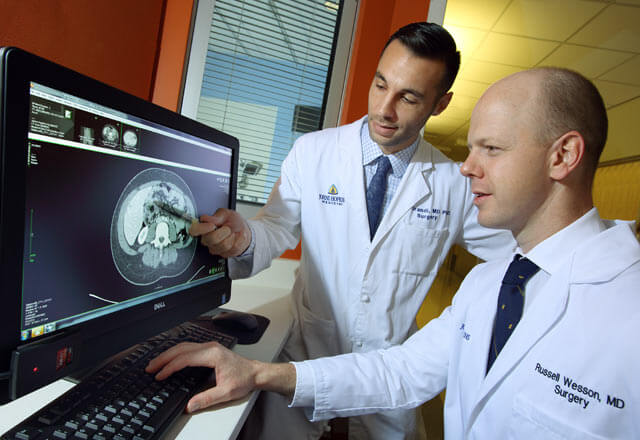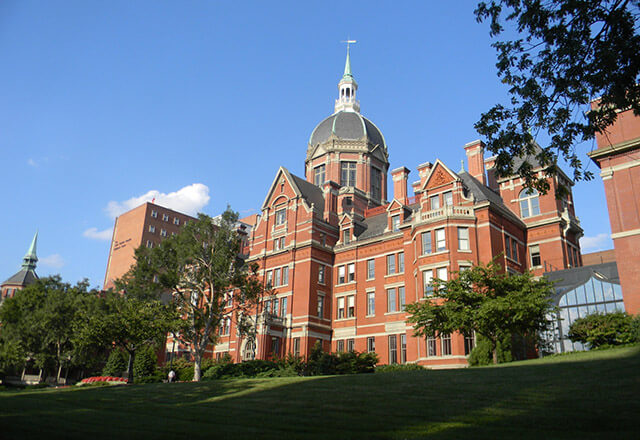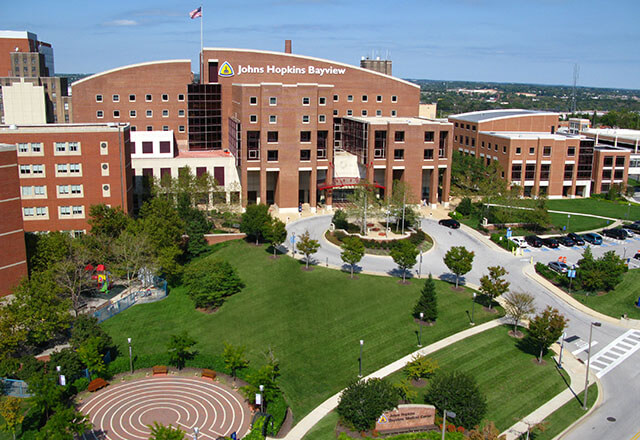General Surgery Training Program

Each year, seven individuals are chosen for the General Surgery Training Program. Our program includes both categorical and preliminary residents. Our preliminary residency track is described more fully below, but these highly qualified individuals are selected from all over the world to obtain broad training in general surgery without the expectation of completing their training in our institution. The seven individuals in the General Surgery Categorical track are expected to become the future leaders in surgery. Our residents are provided with a customized and individualized academic development experience ranging from one to four years, depending on their career goals and prior experiences.
Upon completion of the chief resident (PGY-5) year training, these individuals are eligible to take the American Board of Surgery examinations and apply for any number of advanced clinical training in subspecialties, including cardiothoracic surgery, endocrine surgery, hepatobiliary surgery, minimally invasive surgery, pediatric surgery, plastics and reconstructive surgery, surgical critical care, surgical oncology, thoracic oncology, transplant surgery, trauma surgery and vascular surgery. We also offer a formal early specialization program (ESP) in vascular surgery and focused specialization programs (most specialties), and we are developing an ESP in cardiothoracic surgery.
Clinical Postgraduate Years 1 and 2
The first two clinical years of residency training are focused on the development of foundational skills and experiences in the spectrum of general surgery and its subspecialties. Residents spend about 75 percent of their two years at The Johns Hopkins Hospital and most of the remaining time at Johns Hopkins Bayview Medical Center. Rotations in the PGY-2 year include a focus on developing more advanced technical skills in general surgery, surgical consultation, and management of the critically ill and injured.
Clinical Postgraduate Years 3 to 5
During the third clinical year, residents in the general surgery track receive further training in general, endocrine, colorectal, oncologic, transplant and pediatric surgery, and in acute care and trauma. During the fourth clinical year, residents in the general surgery track receive further training in general, hepatobiliary and trauma, with a special focus on vascular surgery. Some residents select an international rotation to include humanitarian-oriented rotations in underdeveloped/underserved countries around the world. During their fifth clinical year, general surgery residents rotate for eight or nine months at The Johns Hopkins Hospital and for two to three months at Johns Hopkins Bayview Medical Center. Rotations include additional training in trauma surgery, complex hepato-pancreatico-biliary surgery, surgical oncology and complex laparoscopic surgery.
Operative Experience
In recent years, our general surgery residents have performed approximately 1,000 operations at the end of five clinical years. This experience is outstanding in the complexity of surgery performed, especially in hepatic, biliary, pancreatic and vascular surgery. Moreover, operative experience in trauma and surgical critical care is exceptional.
Teaching
The teaching of residents and students within the Department of Surgery is of highest priority. Teaching consists of extensive interaction with faculty, staff, and senior and chief residents on the floors and in the operating room. In addition, a number of conferences, case discussions and didactic lectures designed to supplement the clinical experience are held throughout the week. Each service has its own teaching rounds that focus on discussion of interesting cases, as well as reviews of morbidity and mortality. There are weekly surgical Grand Rounds featuring lectures from Johns Hopkins faculty members and invited leaders in surgery from throughout the world.
In addition, a multitude of small-group conferences led by senior departmental staff members are held each week for residents at all levels. There is a weekly curriculum for interns and those in the PGY-2–5 clinical years. These sessions are led by a faculty member and can include problem-based learning, case discussion or more formal didactic sessions. Weekly reading assignments and quizzes are expected for self-directed learning. Clinical training is supplemented by small group (two to three residents per chief resident/faculty member), hands-on sessions in the minimally invasive training center. These sessions are held weekly, and each resident attends at least once per month. The importance of teaching is emphasized by the annual presentation of awards to the resident and faculty member selected by the house staff and students as the outstanding teachers. A number of additional awards are given to the residents each year.
Research
A one- to four-year research experience is provided for all residents in general surgery. For the unusual applicant who enters residency with a Ph.D. or another advanced degree, personal development plans are negotiated. Many residents choose to perform research in one of any number of laboratories within the Department of Surgery. However, research opportunities can be provided within the basic science departments at Johns Hopkins or at other institutions throughout the United States and the world. The Department of Surgery also affords the opportunity for residents each year to train under a National Institutes of Health T32 training grant for gastrointestinal surgical research. All residents are expected to write and apply for at least two grants so that they develop the skills to apply for competitive funding. Additionally, research conferences led by faculty members are provided on a biweekly basis.
Advanced degrees, including a Ph.D., can be obtained for those interested. The research is designed to provide a solid experience in the scientific method and the performance of scientific investigation with the breadth of topics limited only by the applicant’s cleverness and development of a mentored research plan with the wide spectrum of experts at our many campuses. Emphasis is placed on the advancement of the individual’s research expertise and the foundation of scientific investigative principles. The research year culminates with the presentation of the George D. Zuidema Research Award for the outstanding investigative research performed by a Halsted resident.
Additionally, residents may perform clinical research while obtaining a master’s degree in public health or Ph.D. from the Bloomberg School of Public Health. This training is designed to provide a solid experience in clinical trial design, outcomes research or public policy. The research year culminates with the presentation of the Gershon Efron Research Award for the outstanding investigative clinical research performed by a Halsted resident.
On-Call Schedule
Postgraduate year 3, 4 and 5 residents divide their responsibilities, covering their respective services from home or on an every third- to fifth-night schedule covering the trauma and general surgery call in the hospital.
Benefits
All residents are appointed fellows of the Johns Hopkins University School of Medicine and can take advantage of graduate student discounts on social activities and performing arts programs, both on and off campus. Additional benefits include medical and dental care, disability and life insurance, liability insurance, lab coats and four weeks of paid vacation. The stipend is competitive with other house staff salaries in the region. Residents are also afforded an annual book fund and provided with surgical loupe telescopes.
Wellness Program
We are excited to announce the launch of Halsted4Life, a wellness initiative with the aim of improving health and wellbeing for the Halsted General Surgery residents. We see wellness as a multi-dimensional goal, and strive to help the residents in many different aspects of their lives: personal, professional, and financial. In addition, we feel that a strong sense of community and comradery is essential to resident wellness, and are continuing to foster this through various activities and events.
We kicked off the year by sponsoring the residents in a 5K fun-run around Baltimore’s Inner Harbor. The residents have also tried out a super-sweaty yoga class, as well as a day of stand-up paddle boarding in the Chesapeake. We have had speakers from the financial community come to speak to the residents about topics ranging from home buying to financial management.
More activities are planned for this fall, including a highly anticipated paint-ball day. We will be soliciting input from the residents throughout the year for future events. By promoting wellness with the residents, we believe we will not only improve their lives, but the lives of our patients as well.
Surgery Training Locations
During the general surgery residency training, rotations are offered primarily at two institutions: The Johns Hopkins Hospital and Johns Hopkins Bayview Medical Center. During the 60 months of categorical training, approximately 70 percent of your time is spent at The Johns Hopkins Hospital, 25 percent at Johns Hopkins Bayview Medical Center and 5 percent or less at local affiliated institutions doing elective time.
The Johns Hopkins Hospital

The Johns Hopkins Hospital is a nonprofit general hospital and the flagship of Johns Hopkins Medicine, an organization that brings together the faculty, physicians and scientists of the Johns Hopkins University School of Medicine with the facilities and health professionals of the Johns Hopkins Health System. The hospital has 1,039 acute care beds and includes such renowned centers as the Brady Urological Institute, the Wilmer Eye Institute, the Johns Hopkins Kimmel Cancer Center and the Johns Hopkins Children’s Center.
The Johns Hopkins University School of Medicine, The Johns Hopkins Hospital, the Bloomberg School of Public Health, the Johns Hopkins School of Nursing, the Johns Hopkins Outpatient Center, and numerous buildings devoted to basic science and translational research are located on the East Baltimore campus. While the hospital campus houses several historic buildings, The Johns Hopkins Hospital opened two new hospital facilities and completely renovated historic areas for the care of all acutely ill and injured children and adults.
The Johns Hopkins Bayview Medical Center

Founded in 1773, Johns Hopkins Bayview Medical Center consists of a 331-bed community teaching hospital, including a 20-bed regional burn unit. Elder care services are offered in the nationally renowned Johns Hopkins Geriatrics Center, which provides residential and outpatient care, day care, and house call services.
The surgical services staff, under the direction of Thomas Magnuson, includes surgeons on the full-time faculty of the Johns Hopkins University School of Medicine. The general and specialty surgical services at Johns Hopkins Bayview are fully integrated with their Johns Hopkins programs.
Johns Hopkins General Surgery Residency Program
Hear from current residents and faculty members to get an insider perspective of the General Surgery Residency Program at Johns Hopkins.


